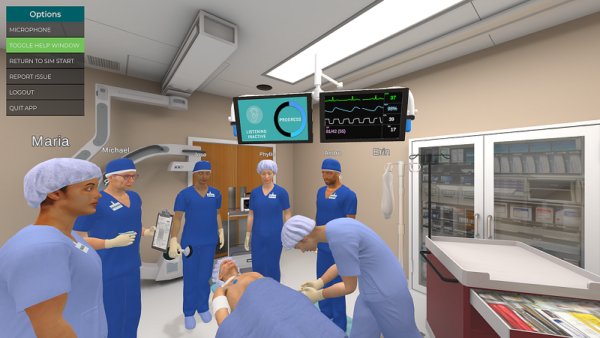Health Scholars received $1 million in grant funding for surge provider training to help combat COVID-19.
The grant will provide approximately14,000 providers its virtual reality (VR) Advanced Cardiac Life Support (ACLS) Desktop Simulation Training to assist health systems with preparedness training. It will enable hospitals to quickly deploy training to surge providers needing to acquire or re-acquire clinical skills related to emergency situations—such as dysrhythmia or a code event.

Image credit: Health Scholars
“Our ACLS simulation provides a deliberate practice environment for surge providers to prepare themselves for acute care—providing the real-to-life reference experience needed to handle inpatient emergencies while on the frontlines of this pandemic,” says Dr. Brian Gillett, President and Chief Medical Officer of Health Scholars.
As hospitals continue to ramp up with the assistance of additional providers to handle the patient surge due to COVID-19, this will entail preparing outpatient providers to perform acute care for inpatients or cross-training providers from other areas of the hospital.
“Surge providers may need to assist with the care of critical patients in the Emergency Department, Intensive Care Unit or General Med-Surge floors, bringing along a challenge of needing to have large numbers of providers quickly acquiring or re-acquiring key clinical skills related to acute care, like ACLS.” Gillett continued.
Health Scholars is currently offering two programs as part of the grant; a matching program for state hospital associations who purchase training at a state level, or individual hospitals or hospital systems that have financial and clinical need can apply to receive ACLS Desktop Simulation Training.
The desktop application is available for purchase now for those looking for a faster way to address emergency preparedness training.
The ACLS Desktop Simulation Training provides a deliberate practice environment for providers to prepare themselves for acute care — which is best achieved through a real-to-life reference experience. The application is an entirely voice-driven, screen-based simulation that trains providers to respond to all 13 core American Heart Association rhythms in stable, unstable and cardiac arrest scenarios. The simulation also trains providers on a traditional ACLS Mega Code and refreshes post-arrest care after return of spontaneous circulation is achieved.
Unique to ACLS Simulation is the use of 100 percent natural language processing. The provider uses voice direction to communicate all of the actions needed to run a resuscitation team. The training takes approximately 20 to 30 minutes to complete, provides a detailed debrief and readiness assessment, and is repeatable on an unlimited basis. And it is immediately available for use.
